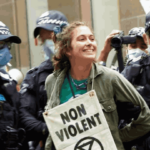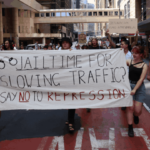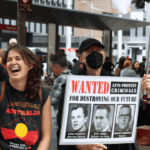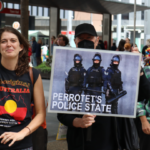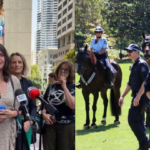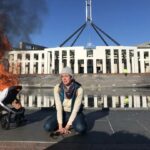“The Climate Movement Is Back”: Violet CoCo on XR Taking Over the Streets of Naarm
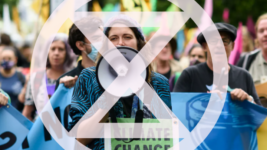
The word over recent weeks is that the local climate movement is back. The People’s Blockade of the World’s Biggest Coal Port saw 3,000 concerned citizens turn up on 25 November to shut down the Newcastle fossil fuel water passage for 32 hours.
And this week, Extinction Rebellion, the group that thrust the climate crisis into the everyday thoughts of the public half a decade ago, is now holding a week of disruptive protests in Naarm-Melbourne, which are to once again bring business as usual to halt.
Prior to the outbreak of COVID-19, tens of thousands of Australians had been staging repeated climate demonstrations across the continent, which only increased with the coming of the unprecedented fires of the black summer of 2019-20.
The onset of pandemic restrictions wiped the numbers off the street. And when climate defenders returned to Sydney thoroughfares in early 2022, local authorities threw the book at them, passing new laws carrying draconian penalties that aimed to paralyse the movement.
Since these laws were passed in NSW, there has been a heightened attempt to demonise the climate defender in the public mind, which has seen these laws mimicked in some form in three other jurisdictions, as well as a crackdown on climate activists by counterterrorism police in WA.
The new laws didn’t keep all climate activists off the street and several defenders, including Violet CoCo, staged a blockade of the Sydney Harbour Bridge in April 2022, which despite only shutting down one lane of traffic, saw the well-known protester sentenced to 15 months imprisonment.
Yet, on appealing her sentence in March this year, CoCo was released on a 12 month conditional release order (CRO), and this outcome has since revealed itself as having set a precedent whereby magistrates aren’t sending protesters to prison in response to these charges due to public outcry.
And it was amongst the crowd gathered out the front of the Sydney Downing Centre in support of Coco’s release that discussions began to be had regarding how the NSW Police Force is applying a technique known as strategic incapacitation that sees bail conditions being weaponised.
Sydney Criminal Lawyers spoke to Violet CoCo about what Extinction Rebellion has planned for Naarm this week, her thoughts on the assertion that the climate movement is reawakening, and how climate collapse is no longer something to fear further down the track.
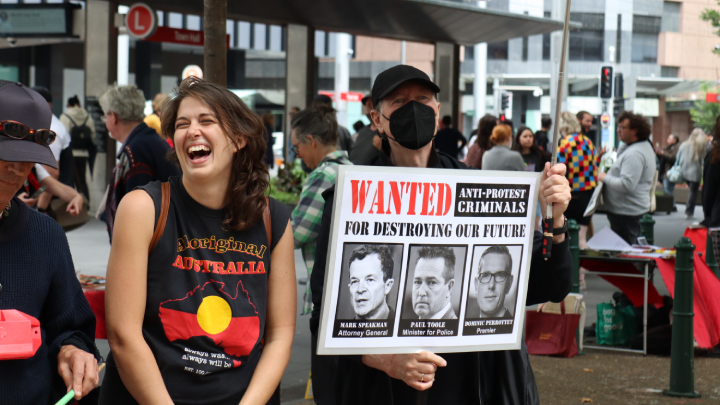
Violet, Tuesday is the first day of five days of Extinction Rebellion events taking place in downtown Melbourne and its surrounds. And looking at the December Rebellion schedule there are a lot of events listed that hint at the disrupting of the city.
So, overall, what can those partaking in or coming into contact with these XR direct actions expect?
The disrupting actions are modelled on the style of the Just Stop Oil UK slow marches. They are slow and solemn marches that draw attention to the farce that is COP28.
As you know, there is this international COP that is supposed to be bringing together world leaders to discuss how to keep our planet cooler than a rise of 1.5°C at the very minimum.
We need this international collaboration now more than ever, but the COP system has become a farce. And UN officials who are in good positions to know what is needed have been calling for mass civil disobedience.
Our week of action is building towards a mass all-in action this Saturday, when Extinction Rebellion and many other allies in the city are going to sit on the road and refuse to move. About 200 people have planned to engage in that action, so it should be a powerful day.
Throughout the week before that, there will also be colourful and disruptive actions that tell the story of the danger we are in: from the farce of the fossil fuel industry to the government’s failure to act on its duty of care and the intrinsic link between climate breakdown and war.
For example, Adani, who is building that massive coal mine in Queensland, also produces weapons.
So, it’s all tied up in the military-industrial complex, which creates more emissions than most nations, and it’s not counted in any of the modelling for our climate and environment.
There are going to be plenty of actions and plenty of disruption. But one thing that Rebellion does particularly well is bring a lot of joy, beauty and creativity to the streets.
Often people call us the beautiful rebellion and that’s because part of civil resistance and engaging in this work, as it is so difficult, is also taking care of each other.
They can expect disruption, but they can also expect joy and a song as well.
So, you’re saying military conflicts such as Ukraine, the assault on Gaza and the buildup to war with China are all compounding the climate crisis?
Absolutely. It is all tied up together. We know that the US has been pushing to get to the fossil fuel deposits just off the Gaza Strip, under the guise of humanitarian aid.
So, with war, there is often an incentive to also claim the land for extractive purposes. That is exactly what happened here in Australia 250 years ago with the First Nations people: those people were displace so this country could be used as an extractivist nation to send the wealth overseas.
War, destruction and genocide come from people wanting to extract wealth from the land.
Weeklong multiple actions in aid of raising climate awareness have seemed like a thing of the past following the crackdown on those specifically raising the climate alarm nationwide.
But after the Rising Tide blockade of Newcastle Port two weeks ago people are stating that the climate campaign is back.
What are your thoughts on these assertions? And where did the climate movement that was bursting at the seams a few years back go?
The climate movement is back. And I cannot tell you how happy that makes me. COVID curbed momentum that was building in the climate and environment movement.
We were only able to protest in small groups at the best of times.
At the time, I asserted that climate defenders are essential workers – if the coal mines are running and the loggers are murdering our forests, then we need defenders out there defending them as an essential service – but many held back and waited for the lockdown mandates to end.
However, now the environmental movement is waking up and getting back to work, and to be honest, it couldn’t be fast enough, as we are in the endgame and climate breakdown has begun.
We are on the edge of runaway global warming and the chances of staying below 1.5°C are almost zero.
We are risking billions of lives lost and societal collapse and Australia is in the death zone. On our current trajectory over one-third of the country may be uninhabitable by mid-century.
We want peace, justice and a liveable planet. Just today at our orientation, we had a flourish of new members and many, many old hats, who we haven’t seen in a while, joined.
We are gearing up, as these next 12 months for the environment are going to be the most important.
The December Rebellion is being held in Melbourne. Such an event in Sydney still seems like a thing of the past following the state government having rolled out its stark antiprotest regime, which has since been mirrored in some form in three other states.
Would you agree that it’s easier to hold such events in Naarm these days? And what’s the difference between the two jurisdictions?
Sydney police use strategic incapacitation against protesters, which is policing in a way that’s specifically designed to discourage further engagement in protests by being excessively punitive.
In Sydney or Gadigal Country, a few weeks ago, peace protesters were targeted by police and arrested after targeting a weapons dealer luncheon. They were arrested for the protests from their homes and even from Ubers.
However, there was just a week of action on Sydney-Gadigal Country called Climate Cop Out, which was a week of marches and bike rides around the city and that was successfully able to run, and protesters were able to get on the streets without excessive force being used on them.
So, the most important thing to remember is that these new laws are not holding up in the court of public opinion. That was seen strongly when the judiciary used their overreach and sent me to prison.
Protesters came out. Those were the biggest protests around the country since COVID. That was people demanding our right to protest in terms of the environment movement.
So, since my sentence was overturned, many people have had those new laws, the 144G charge in NSW, dropped or not even laid.
With these smaller protests, the peace protests, the police have more capacity to use strategic incapacitation because they are not subject as much to the court of public opinion, because there are not as many people paying attention.
But as soon as those marches get bigger, they have to be held in line, they have to behave better, because they are then being held to the scrutiny of public opinion.
The fact that they are introducing these laws is a sign that the protests are successful because they are pushing to repress them, and they wouldn’t be doing that if they weren’t strong enough to annoy them.
So, your case acted as a bit of a litmus test regarding those antiprotest laws, which saw them consider using prison time on climate defenders but found they couldn’t because of the public outcry over your detention?
Yes. When my case was brought forward and there was such massive dissent over activists being sent to prison, it held them to account.
It brought the issue forward, and it was the first time the unions really got on board with the climate movement, and it really showed a lot of strength on our end.
It did work as a litmus test in terms of the judiciary gaoling peaceful activists and obviously, they failed in their capacity to do that.
And you’ve saying there should now be protests against strategic incapacitation techniques?
Absolutely. It is not holding with our democracy that police officers are allowed to, like robocops, enact their own justice on peaceful protesters, with the mindset of encouraging demonstrators and others not to engage in democracy via protesting.
The crackdown on climate defenders has been severe over the last couple of years. There has been the imposition of draconian laws in some states, whereas in WA, your friends at Disrupt Burrup Hub have been facing an ongoing police campaign against their nonviolent actions.
What are your thoughts on the demonisation of the climate defender?
Australia is the third largest exporter of carbon emissions. Our state is heavily influenced by the financial interests of the fossil fuel industry.
So, it is obvious, especially in places like Western Australia, that there is a huge influence from the corporations on police to strategically incapacitate those protests.
Again, this is a sign of effectiveness that they want to push and repress us, because if we were easy to ignore, then they would.
When it comes to Disrupt Burrup Hub it is an extremely small crew at the moment. But they have been incredibly effective in drawing attention to the largest fossil fuel project going on at the moment, which is the Woodside gas project.
It will triple Australia’s carbon emissions just with that one project. It is going to be absolutely devastating for any kind of targets that we might be planning to achieve.
I’m not sure how it is going ahead, but they are going ahead, and they are about to do seismic testing in WA, which is going to kill many whales.
My heart is with the climate protesters who are being demonised by police and by groups that spread disinformation about the environment and protesters.
But it is also a sign of success. So, we just have to push through. Nobody liked the Suffragettes. They didn’t like what the Suffragettes did, but they did think that women should get the vote.
Sometimes being liked and being effective are two separate things.
Just a few years ago, all eyes were on PM Scott Morrison when he went to the COP and disgraced the nation with his climate denying stance.
Back then we were all aware that the global convention was on, however this year’s COP28 in the United Arab Emirates is going somewhat unnoticed.
Not only has the event been given a lot less attention than in previous years, but it has also come to light that the UAE has been taking the opportunity of the global meeting to square up some new fossil fuel deals.
How has it come to be that the global focus on climate has shifted in this manner?
It is devastating that the president of the COP has secured new fossil fuels deals from that position and asserted that there is no science behind a transition away from fossil fuels. This is terrifying.
But I just want to address locally, Albanese and the Labor government are really good at portraying themselves as the good guys on climate, while continuing business as usual and approving new coal and gas.
They are not as loud and proud about their lack of climate action in the media at large, and no one is holding them to account in the same way, because it is a more complicated story.
No one wants to discredit Labor, so the Liberals get elected again. And in that way, it makes them a wolf in sheep’s clothing. It almost makes them more dangerous.
It feels like the world has moved on a bit from its climate focus due to a number of factors like major political crises from COVID to Israel-Palestine, the Voice referendum or US political instability.
But basically in 2019, it was so unique because the world momentarily gave climate the attention it deserved. And other things that seem more immediate have started to take up more airtime, however we know that with climate breakdown, there is no justice on a dead planet.
So, it really is the be-all and end-all issue, even though all of these other issues are so intrinsically wrapped up in it.
In addition, there is a concerted effort from the fossil fuel industry and their servants in government around the world to make sure that the climate movement doesn’t get the airtime that it deserves.
Climate breakdown has begun, and we are heading for immense suffering, with millions of deaths, the collapse of organised society and the collapse of the natural world.
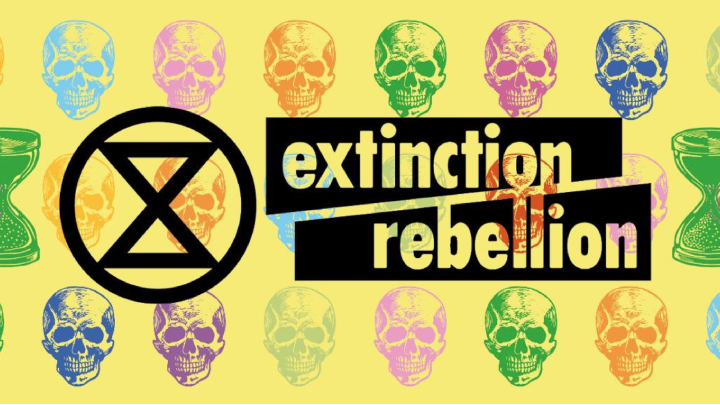
And lastly, Violet, whilst the climate movement might be rising again after a pause, the climate crisis hasn’t stopped. In fact, it seems to have progressed into extreme weather events taking place somewhere around the globe 24/7 all year long.
Where do you consider the crisis to be at? Should we all be getting comfortable now that the space between us and the fires and floods has been a number of years?
We are witnessing ever-increasing catastrophic weather events, cataclysmic fires, massive floods, infectious diseases, island nations inundated, polar ice melting, millions of hectares of precious forest and environments destroyed, and lives extinguished across the world and close to home.
I personally have just moved from the NSW Northern Rivers, and I witnessed firsthand the devastation of the floods there, and there is nothing to be comfortable about in the situation we are now in.
The average global temperature has already hit 2°C well ahead of predictions. And many scientists acknowledge we are on a trajectory to surpass 3°C global warming before the end of this century.
So, it is time now to get involved, because if not you, then who? If not now, then when? And when better be today because tomorrow is going to be too late.
The details of the Extinction Rebellion December Rebellion in Naarm-Melbourne this week are set out here.
Note: This article previously had Violet CoCo stating that the Centre for Independent Studies was created by Atlas and is financed by companies like Shell and Exxon.
The Centre has contacted and assured that both these statements are untrue, and we apologise to the Centre for Independent Studies for any errors that may have been published.
The statements in question have been removed from the article.


